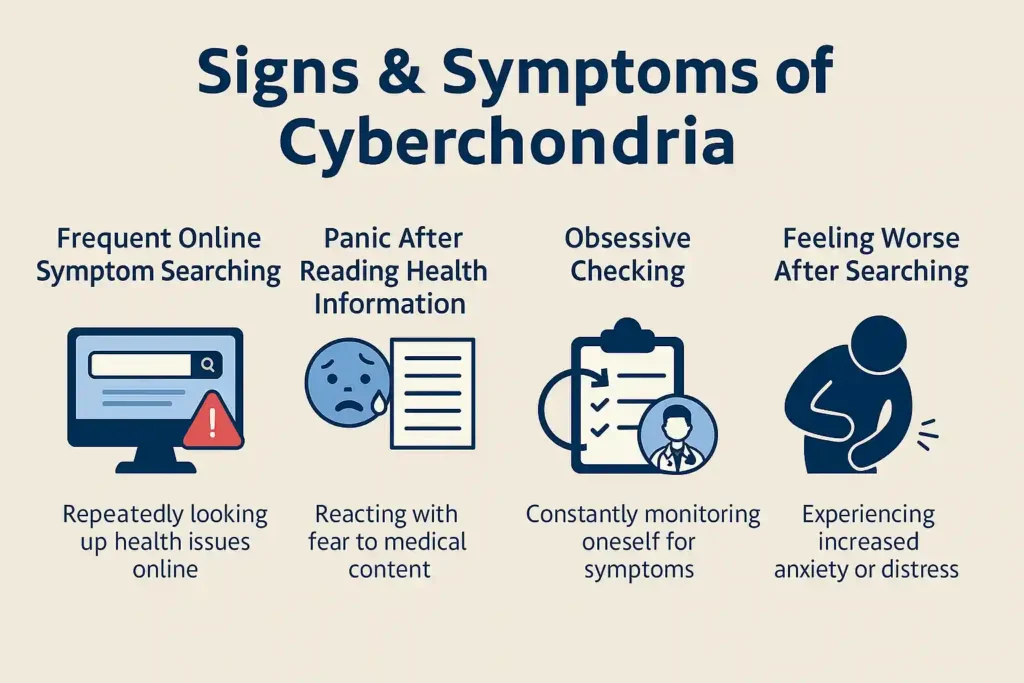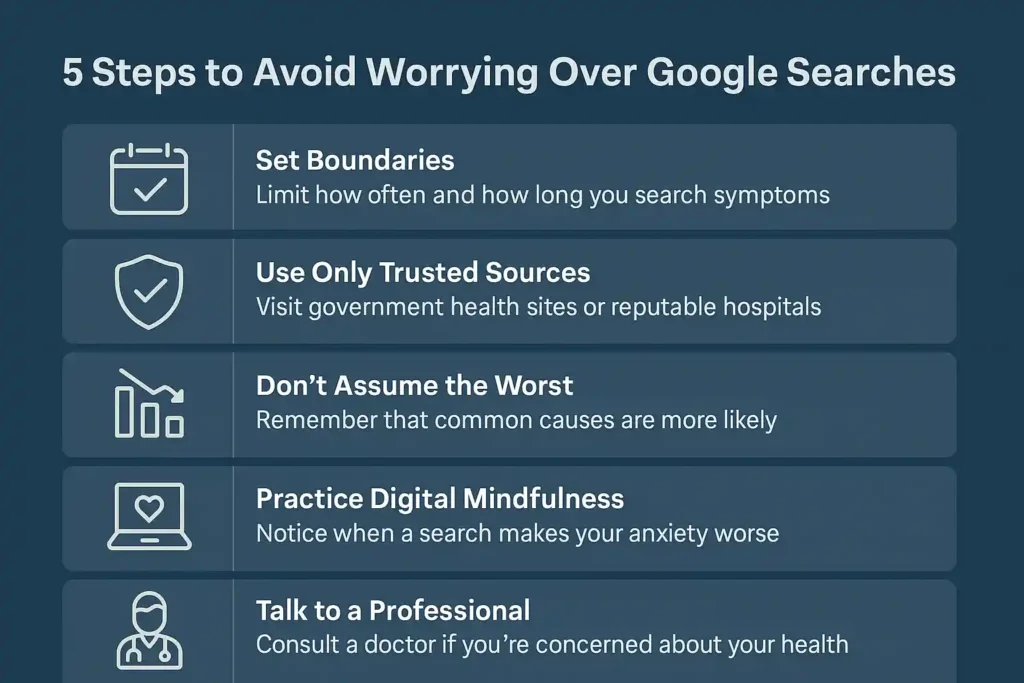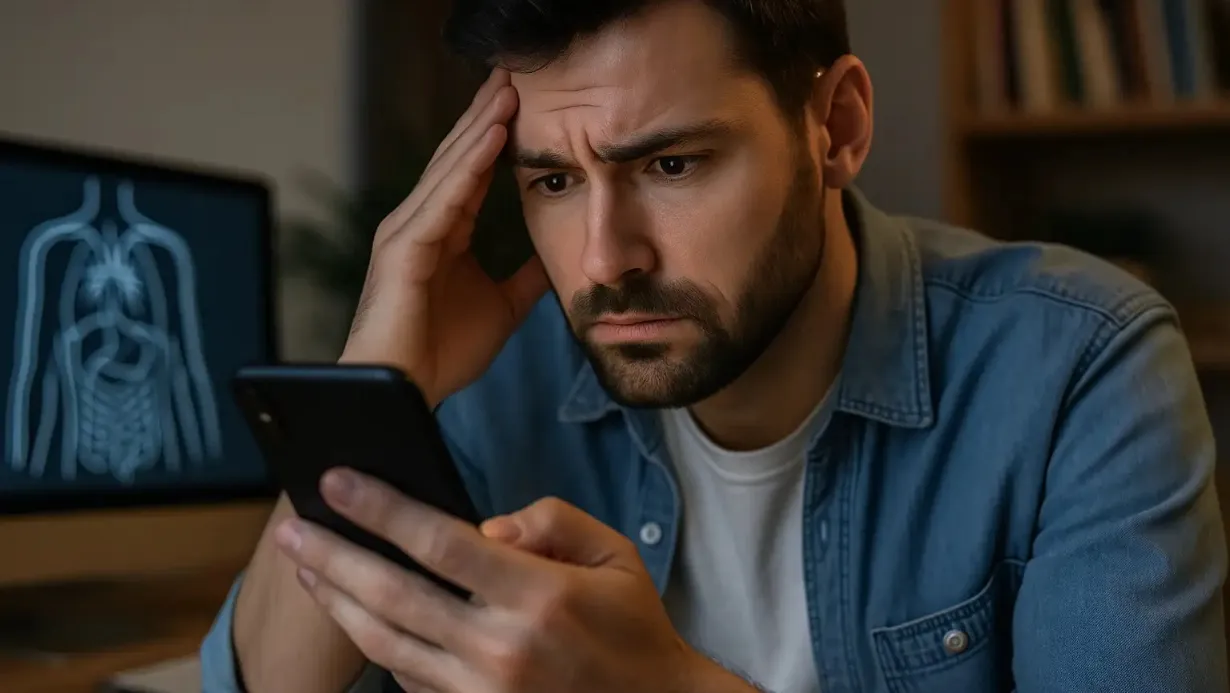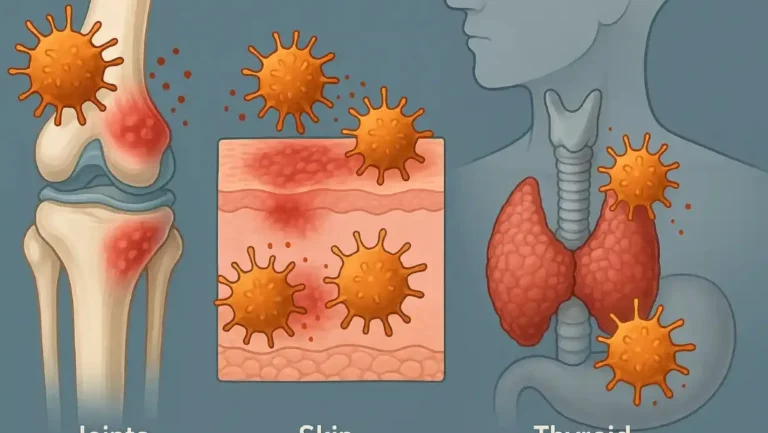Introduction: The Health Search Spiral
Cyberchondria and health anxiety often go hand in hand. You notice a slight headache, feel a strange tingle, or get a stomach cramp. You open your browser and search your symptoms. Within minutes, you’re convinced it’s something serious; maybe cancer, a brain tumor, or a rare disorder you’ve never heard of.
But what starts as a quick search soon becomes a spiral of panic. Before you know it, you’re clicking through forum posts, reading scary articles, and imagining the worst. It’s a pattern that causes fear, sleepless nights, and constant symptom checking behavior.
For some, it becomes an obsession. And in today’s world, where information is one click away, millions fall into this trap every day.
While technology gives us access to medical information online, it also opens the door to fear. If you often find yourself feeling worse after a Google search, keep reading.
Let’s explore what cyberchondria really is, why it feeds health anxiety, and what you can do to stop yourself from going down the rabbit hole of obsessive Google searching.
What Is Cyberchondria?
Cyberchondria is the urge to repeatedly search your symptoms online, which leads to rising health anxiety. It’s not just a bad habit; it’s a mental pattern that keeps you stuck in fear, even when nothing is wrong physically.
This behavior often begins with Self-diagnosis online, where people try to “figure out” what’s wrong without speaking to a doctor. But instead of relief, they often find more confusion. One search turns into ten. Normal signs of a cold suddenly look like life-threatening conditions.
Unlike general curiosity, cyberchondria symptoms include compulsive searching, constant doubt, and the inability to believe a clean bill of health. You may visit a doctor, feel okay for a day, but then fall back into obsessive Google searching again. This cycle only strengthens your health-related anxiety and makes it harder to trust professionals.
Why Googling Symptoms Feeds Anxiety?

When you search online, you get access to tons of medical information online but most of it isn’t filtered for accuracy or relevance. A sore throat could be strep or it could be cancer. Guess which one gets the most clicks?
The internet doesn’t know your health history, your body, or your current condition. It just throws possible results at you. That’s why Doctor vs Google diagnosis is not even close to fair.
The problem is your brain remembers scary stuff. Once you read the worst-case outcome, it sticks. This creates a loop of compulsive health searches, fear, and more Googling.
Signs You Might Be Dealing with Cyberchondria
If you think you might have cyberchondria, here are signs to watch for:
- You check your symptoms online multiple times a day
- You often believe you have serious diseases
- You feel panic after reading about a condition
- You jump from one possible diagnosis to another
- You stop trusting doctors and prefer online info
- You feel worse after looking up symptoms
If this sounds familiar, it might be time to take a break from symptom checking behavior.
How to Avoid Worrying Over Google Searches?

You don’t have to stop using the internet for health info altogether. But you do need to build smarter habits. Here’s how:
Set Boundaries
Limit how often and how long you search for symptoms. For example, give yourself 10 minutes max and only once a day.
This helps break the loop of obsessive Google searching.
Use Only Trusted Sources
Stick to government health sites or well-known hospitals. Avoid forums or random blogs that can fuel fear and give misdiagnosis from the internet.
Building digital health literacy is key. Knowing what to trust and what to skip makes a huge difference.
Don’t Assume the Worst
Google lists rare, scary diseases first because those pages get more clicks. That doesn’t mean they apply to you.
Avoid jumping to conclusions. Most symptoms have common and harmless causes.
Practice Digital Mindfulness
Before you search, ask: “Is this helping or hurting me?” Recognize when fear is guiding your clicks. If you feel your anxiety rising, pause. Distract your mind. Repeating this builds emotional control and reduces online health anxiety.
Talk to a Professional
Don’t skip doctors and trust Google instead. If you’re worried, speak to a real doctor, not the internet. Doctors can give accurate answers and calm your fears.
If your worry feels out of control, a mental health expert can help with managing health anxiety too.
When Cyberchondria Becomes a Mental Health Concern?
At some point, cyberchondria can move beyond a bad habit and turn into a real mental health problem. That’s when it causes:
- Trouble sleeping
- Panic attacks
- Depression
- Obsessive thinking
- Social withdrawal
In such cases, it’s not just online health anxiety anymore. It could be tied to general anxiety, OCD, or health-related phobias. That’s when it’s time to get professional help.
The internet may have started the problem, but it’s not going to fix it.
Treatment Approaches for Cyberchondria
The most effective method is cognitive behavioral therapy for anxiety (CBT). CBT helps you:
- Challenge fearful thoughts
- Replace them with facts
- Break the pattern of reassurance-seeking behavior
- Learn how to handle uncertainty
Therapy teaches you to stop feeding your fear with medical information online and build confidence in your health and your body.
Sometimes, doctors may also suggest medication to treat intense health anxiety or OCD symptoms. But in many cases, therapy alone can make a big difference in overcoming cyberchondria.
Conclusion: Stay Informed, Not Obsessed
It’s okay to be curious about your health. It’s okay to ask questions and search for answers.
But if those searches leave you scared, overwhelmed, or unable to function, it’s time to rethink your habits.
Cyberchondria is real. So the goal isn’t to avoid health info but to use it wisely. Trust your doctor, not Google. Ask questions, but don’t obsess. Stay informed, not anxious.
Your health matters. But your peace of mind does too.
Cyberchondria FAQs
What is cyberchondria?
Cyberchondria is the habit of searching symptoms online repeatedly, which increases fear and leads to worsening health anxiety instead of relief or answers.
What does cyberchondria mean?
It means online searching leads to irrational health fears. It’s a combination of internet use and health-related anxiety that creates unnecessary panic and stress.
Is cyberchondria curable?
Yes. With support like therapy, behavioral changes, and sometimes medication, overcoming cyberchondria is completely possible for most people.
How to stop being a cyberchondriac?
Limit searches, use reliable sources, and seek therapy if needed. Also, practice stopping reassurance-seeking behavior and build trust in your own body.
What causes cyberchondria?
It’s caused by anxiety, low trust in doctors, constant access to medical information online, and emotional reactions to scary online content.
How do I know if I have cyberchondria?
If you feel worse after searching, can’t stop Googling, or distrust doctors’ opinions, these could be signs of cyberchondria symptoms.
Is it bad to look up symptoms on Google?
It’s not always bad. But if it leads to stress, panic, or wrong beliefs, it can fuel worrying over Google searches and make anxiety worse.
Can cyberchondria affect my mental health?
Yes. It can raise your stress levels, lead to depression, and make you avoid daily activities. It harms both your mental health and internet use habits.
Are there treatments for cyberchondria?
Yes. Cognitive behavioral therapy for anxiety is the most common. Support groups and anxiety medications may also help in more serious cases.
Should I avoid the internet altogether for health information?
No. Just use it wisely. Avoid forums, learn to start trusting online health information from professionals, and limit time spent searching.
















Leave a Comment